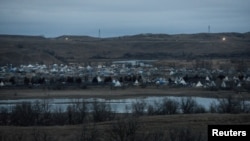North Dakota officials on Tuesday moved to block supplies from reaching oil pipeline protesters at a camp near the construction site, threatening to use hefty fines to keep demonstrators from receiving food, building materials and even portable bathrooms.
Activists have spent months protesting plans to route the $3.8 billion Dakota Access Pipeline beneath a lake near the Standing Rock Sioux reservation, saying the project poses a threat to water resources and sacred Native American sites.
State officials said on Tuesday they would fine anyone bringing prohibited items into the main protest camp following Governor Jack Dalrymple's "emergency evacuation" order on Monday. Earlier, officials had warned of a physical blockade, but the governor's office backed away from that.
Law enforcement would take a more "passive role" than enforcing a blockade, said Maxine Herr, a spokeswoman for the Morton County Sheriff's Department.
"The governor is more interested in public safety than setting up a road block and turning people away," Herr said by telephone.
Officers will stop vehicles they believe are headed to the camp and inform drivers they are committing an infraction and could be fined $1,000.
These penalties should serve as a hindrance, according to Cecily Fong, a spokeswoman for the North Dakota Department of Emergency Services.
"So that effectively is going to block that stuff [supplies], but there is not going to be a hard road block," Fong said by telephone.
A spokeswoman from the Standing Rock Sioux tribe was not immediately available for comment.
North Dakota Governor-elect Doug Burgum, a Republican, declined to comment.
The 1,172-mile (1,885-km) pipeline project, owned by Texas-based Energy Transfer Partners LP, is mostly complete except for a segment planned to run under Lake Oahe, a reservoir formed by a dam on the Missouri River.
Thousands of people are protesting at camps located on U.S. Army Corps of Engineers land, north of the Cannonball River in Cannon Ball, North Dakota. The main protest camp near Cannon Ball is called Oceti Sakowin, the original name of the Sioux, meaning Seven Council Fires.
Protest leaders said state officials and local law enforcement officers were "bullying" demonstrators with the threat of fines.
"It's bogus and I don't know about the legality of it," said Kandi Mossett, an organizer with Indigenous Environmental Network. "We're not afraid. We're moving in and out of the camp at will. So people shouldn't be afraid of coming and supporting the water protectors. They've been bullying us since day one."
‘Harsh winter conditions’
Dalrymple's evacuation order was issued on Monday due to the "harsh winter conditions." Snow and wind gusts up to 45 mph (73 kph) were forecast for Tuesday, according to the National Weather Service.
Despite the sub-freezing temperatures, law enforcement on Nov. 21 used water cannons to disperse protesters who had blockaded a highway.
Demonstrators and law enforcement have clashed over the months since protests began, with demonstrators claiming excessive use of force by law enforcement.
On Tuesday, the National Lawyers Guild filed a class action in U.S. District Court in North Dakota on behalf of injured protesters, claiming local authorities in Morton and Stutsman counties used excessive force.
The civil rights complaint said there were no orders to disperse or warnings issued before local police turned water cannons and tear gas on the protest. The lawsuit seeks compensatory damages.
Stutsman County Auditor Casey Bradley said the county sheriff's office was unaware of the lawsuit and unable to comment on the allegations.
Officers were justified in using water cannons because of the threat posed by demonstrators, Fong and Herr said. Law enforcement gave numerous warnings for protesters to disperse, they said.
North Dakota officials have issued several requests for additional help from federal law enforcement in light of the demonstrators. However, the Army Corps said Monday its order to evacuate the primary protest camp by Dec. 5 would not include forcibly removing people from the land.
The Obama administration in September postponed final approval of a Army Corps' permit required to allow tunneling beneath the lake, a move intended to give federal officials more time to consult tribal leaders.
White House spokesman Josh Earnest said in a Tuesday news briefing that Obama believes law enforcement has "an obligation" to show restraint and protesters have a "responsibility" to protest peacefully.
In a related protest, prosecutors suspended charges against Deia Schlosberg, a documentary maker arrested while filming as environmental protesters attempted to shut down the flow of oil through pipelines carrying crude from Canada to the United States in October.





